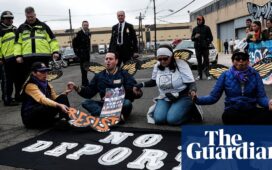Jesus Contreras tore into his breakfast sandwich after getting off a 24-hour shift as a paramedic in the Houston area of Texas. He had got maybe 15 minutes’ sleep the night before.
Contreras, 26, is on the frontline of the US response to the coronavirus pandemic, a health crisis of epic proportions. But he is also one of an estimated 29,000 people in healthcare occupations who rely on an Obama-era immigration policy to shield them from deportation, according to a forthcoming analysis from the Center for American Progress (Cap).
Deferred Action for Childhood Arrivals, or Daca, allows undocumented “Dreamers” who came to the United States as kids to work legally and live without the constant looming threat of immigration enforcement officers knocking on their doors.
As the supreme court considers whether to greenlight his and hundreds of thousands of other potential deportations during this global pandemic, Contreras believes that getting rid of so many healthcare workers and other talented individuals when the country desperately needs them doesn’t make sense.
“From a heartfelt perspective, it’s like, you know, betraying us despite all the things that we’re doing. From a logical perspective, it’s just counterintuitive,” he said.
Many of these roughly 650,000 young people have grown up almost entirely in the US and are deeply rooted in their communities. Contreras, for example, moved to Texas when he was six years old and has lived in the Houston area for two decades.
Daca has allowed more than 3,000 registered nurses, almost 5,000 nursing and home health aides and about 4,000 medical assistants to enter their professions, among other healthcare fields, Cap found. Nearly 200 of the program’s beneficiaries are medical students, residents or physicians, according to the Association of American Medical Colleges (AAMC).
Donald Trump has been adamant about ending Daca, a goal that’s been stalled for years because of drawn-out court battles that have finally landed in front of the supreme court. Now, the country’s foremost justices are in the process of concluding whether the Trump administration can legally move forward with its plans to rescind the policy, or if that action is even judicially reviewable.
Oral arguments took place in November. Their decision is due at any moment.
Daniel, a 32-year-old registered nurse in New Jersey who asked to use only his first name because he feared retaliation at work, has sometimes worried about being able to financially support his loved ones if he could no longer renew Daca. His mom just lost her customer service job because of how the pandemic has ravaged the economy, adding even more pressure.
And yet he’s soldiering on, working shifts in an intensive care unit, where he said the majority of patients are Covid-positive, intubated and ventilated.
As he described what it’s been like to treat people with Covid-19 – controlling their vital signs, increasing their oxygen, watching for frowns or other pain indicators – his voice is strained. “It’s tough,” he said. “I mean, it’s very sad.”
A lot of nurses and doctors are getting sick, he said. One of his fellow nurses told him she cried before her shift because they were shouldering too much work.
Like other medical personnel, Daniel is worried about having to wear the same PPE for 12 hours and then saving it to potentially reuse in the future. And he is concerned that he’ll bring the virus back home to his family.
But unlike other medical personnel, he also has to think about the very real possibility that someday soon, he may not be able to do his job at all.
“I’m in a career to help people,” Daniel said. “But because of my immigration status, it just puts me in a limbo.”
Once US Immigration and Customs Enforcement (Ice) gets the go-ahead from the court, it intends to start deporting Dreamers, the agency’s acting head said earlier this year.
“I can only imagine what that must feel like, to be putting your life literally on the line for a country, and for the wellbeing of the residents of a country, that isn’t, hasn’t decided whether you’re gonna be allowed to stay there,” said Julia Gelatt, a senior policy analyst at the Migration Policy Institute.
Without Daca, Dreamers will lose the protection that has let them “build a life in the US”, said Camila Bustos, a law student intern with the Jerome N Frank Legal Services Organization. And, though their wider contributions to society shouldn’t trump their humanity, they will also lose their work authorization, she said.
A hit of that magnitude to the country’s healthcare workforce could be “potentially devastating”, the AAMC argued even before Covid-19 came to the US. But especially in the context of a global pandemic, as states plead for more healthcare professionals to outfit overwhelmed hospitals, attorneys and advocates are asking the supreme court to consider their ruling’s potential ramifications.
“We’re saying, side with immigrant young people,” said Bruna Sollod, communications director at United We Dream, an immigrant youth-led organization. “Side with the folks who are on the frontlines of this. Side with the folks who are hurting and really in danger of getting sick, in danger of losing their jobs. In danger of not providing for their families.”








